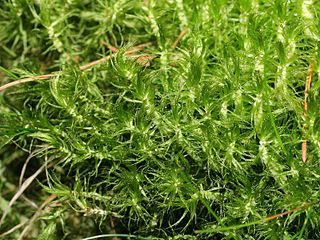
Dicranum is a genus of mosses, also called wind-blown mosses or fork mosses. These mosses form in densely packed clumps. Stems may fork, but do not branch. In general, upright stems will be single but packed together. Dicranum is distributed globally. In North America these are commonly found in Jack pine or Red pine stands.
Samuel Elisée Bridel-Brideri was a Swiss-German bryologist.

Carolina Del Carmen Brid Cerrud (born July 4, 1990) is a Panamanian actress, TV host, model and winner of the Miss Tourism Panamá 2011, Miss Metropolitan International 2011 and Miss Panama 2013 beauty pageants. She represented Panama at the Miss Universe 2013 pageant.

Pogonatum is a genus of mosses — commonly called spike moss — which contains approximately 70 species that cover a cosmopolitan distribution. It can be seen mostly in Asian countries with a tropical climate.
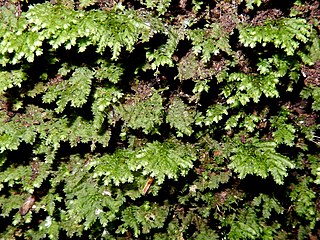
Hypopterygium is a genus of moss in the family Hypopterygiaceae. It contains the following species:

Rallicola is a genus of chewing louse. It is an ectoparasite of rails and other birds. It was named by Thomas Harvey Johnston and Launcelot Harrison in 1911. There are two subgenera aside from the nominotypical subgenus: Aptericola, whose species are found on kiwi birds, and Huiacola, a monospecific subgenus consisting of Rallicola extinctus, once found on the huia.
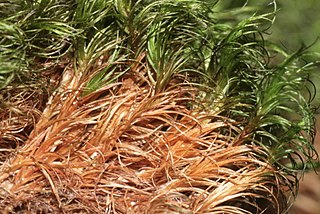
Campylopus is a genus of 180 species of haplolepideous mosses (Dicranidae) in the family Leucobryaceae. The name comes from the Greek campylos, meaning curved, and pous, meaning foot, referring to the setae which curve downwards.

Leucobryum is a genus of haplolepideous mosses (Dicranidae) in the family Leucobryaceae. The name comes from the Greek leukos, meaning white, and bryon, meaning moss.

Rhabdoweisiaceae is a family of haplolepideous mosses (Dicranidae) in the order Dicranales. It consists of 16 genera.
Catoscopium is a genus of haplolepidous mosses (Dicranidae) in the monotypic family Catoscopiaceae .
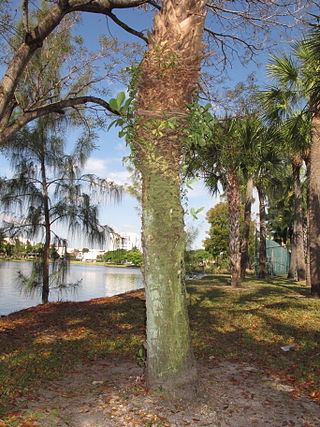
Octoblepharum is a genus of haplolepideous mosses (Dicranidae) in the monotypic family Octoblepharaceae . The genus Octoblepharum was previously placed in family Calymperaceae.

Neckera is a large genus of mosses belonging to the family Neckeraceae. The genus was first described by Johann Hedwig. The genus has a cosmopolitan distribution.

Philonotis is a genus of mosses belonging to the family Bartramiaceae.
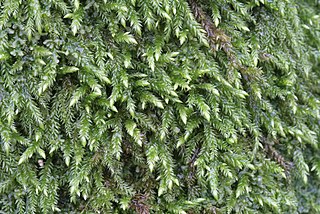
Isothecium is a genus of mosses belonging to the family Lembophyllaceae. The genus has a cosmopolitan distribution.

Rhizogonium is a genus of mosses belonging to the family Rhizogoniaceae.

Ptychostomum is a genus of mosses belonging to the family Bryaceae. It has an almost cosmopolitan distribution.
Plagiopus is a genus of mosses belonging to the family Bartramiaceae.

Oncophorus virens is a species of moss in the genus Oncophorus native to Alaska.
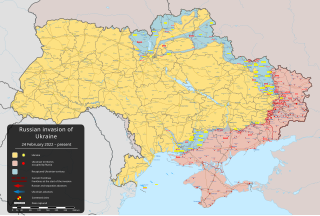
The battle of Davydiv Brid was a Ukrainian counter-offensive operation during the 2022 Russian invasion of Ukraine. In reaction to Russia's southern Ukraine offensive, Ukrainian forces attempted to recapture part of the Russian-occupied Kherson Oblast and tie up Russian resources. The counter-offensive began on 27 May 2022 and was centered near the village of Davydiv Brid, which was recaptured by Ukraine, however they were pushed back over the Inhulets River by 16 June 2022. However, another bridgehead near Lozove was retained by Ukrainian forces. In a subsequent Ukrainian southern counteroffensive that was launched two and a half months later, Davydiv Brid was reported as captured by Ukrainian forces on 4 October.















